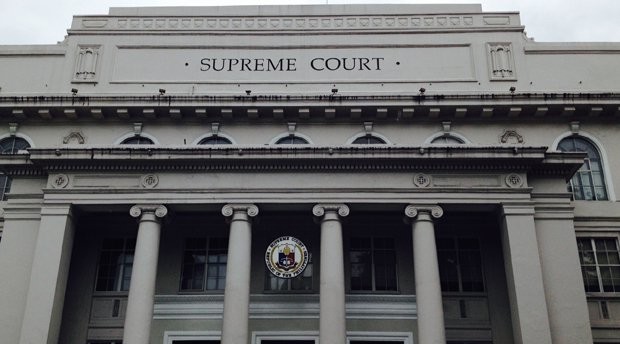SC told to decide petition requiring Congress to convene on ML issue

Supreme Court facade (File photo from the Philippine Daily Inquirer)
Several martial law petitioners on Friday asked the Supreme Court (SC) to act upon a petition requiring the Senate and the House of Representatives to convene and tackle the legality of President Rodrigo Duterte’s imposition of martial rule in Mindanao.
In a manifestation filed on Friday, former Senator Rene Saguisag, detained Senator Leila de Lima, former Commission on Human Rights chair Loretta Ann Rosales and former peace negotiator Alex Padilla told the SC that it is necessary for the high court to issue a ruling on the matter to clarify the duties of Congress as stated under Section 18 Article VII of the 1987 Constitution.
In their original petition to the Supreme Court filed on June 6, the petitioners insisted that the 1987 Constitution is very clear that Congress has the ministerial duty to convene a joint session and deliberate the factual and constitutional basis for martial law.
Even after the SC had already upheld the validity of martial law, the petitioners said it is still important for the legislative bodies to follow the Constitution by obliging both Congress to convene in a joint session and deliberate the legality of the President’s martial law.
READ: SC upholds validity of martial law in Mindanao
Article VII Section 18 of the 1987 Constitution provides that “…The Congress, voting jointly, by a vote of at least a majority of all its Members in regular or special session, may revoke such proclamation or suspension, which revocation shall not be set aside by the President. Upon the initiative of the President, the Congress may, in the same manner, extend such proclamation or suspension for a period to be determined by the Congress, if the invasion or rebellion shall persist and public safety requires it.”
The Constitution also suggests that “The Congress, if not in session, shall, within twenty-four hours following such proclamation or suspension, convene in accordance with its rules without any need of a call.”
However, in expressing support to Duterte’s martial law, the House of Representatives and the Senate issued separate resolutions expressing support to the President’s Proclamation 216, placing the entire region of Mindanao under martial law.
The lawmakers insists that a joint session is only required if the proclamation will be revoked.
Duterte’s 60-day martial law will end on July 22, 2017. The police, military and even the legislative sector have expressed intention of recommending its extension.
The petitioners, led by their counsel former Solicitor General Florin Hilbay, said that the high court should clarify the duties of Congress under Article VII Section 18 of the Constitution to properly guide all branches of government.
They argued that what both houses of Congress has done by approving House Resolution 1050 and Senate Resolution 388 expressing support to the declaration of martial law cannot be considered compliance with the provision of the Constitution particularly Section VII, Section 18, which states that “Congress voting jointly, by a vote of at least a majority of all its members in regular or special session, may revoke such proclamation or suspension, which revocation shall not be set aside from the President.”
“These acts cannot be considered compliance with the clear constitutional requirement for Congress to convene and vote jointly. They are ineffectual in relation to the Congress’ obligation to jointly convene and vote consistent with its obligation under the Constitution,” the petitioners said.
“We need to see that the system of checks and balances in our Constitution are working. Congress should not be allowed to shirk from or disregard its duty. The failure of Congress to act as a single deliberative body cannot be substituted with separate resolutions passed by both Houses of Congress. Substantial compliance is no compliance,” they added.
Hilbay said even with the likely extension of martial law, there is still no indication that the legislative will convene jointly despite requirement under the Constitution.
“The Honorable Court must not allow the Congress to handicap the Constitution by its inaction,” petitioners said it their manifestation.
Hilbay added that while the high court can still rule on their petition even after the lapse of the 60-day period, “the best time to decide is now because if the President decide to extend the proclamation and decides to declare martial law anew, then it becomes more problematic for the Supreme Court because they will decide on a live case.” JPV